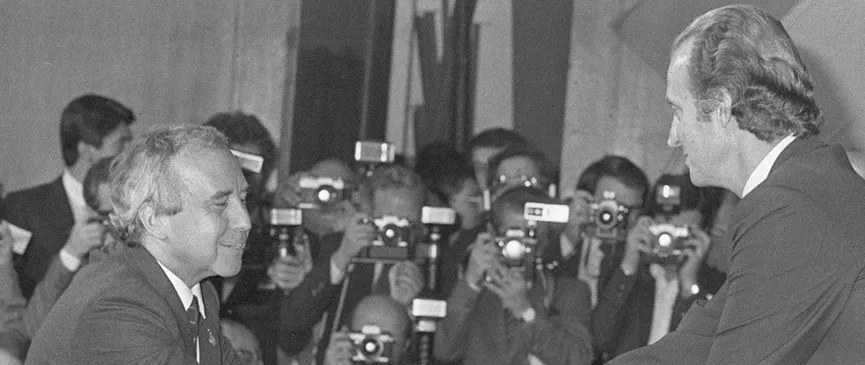Main content
Pablo García Baena Prince of Asturias Award for Literature 1984

Pablo García Baena (Córdoba, Spain, 1923 – 2018) lived as a teenager and young man in his hometown, where he was a regularly contributor to local newspapers. In 1947, together with the poets Ricardo Molina, Juan Bernier, Julio Aumente and Mario López and the painters Miguel del Moral and Ginés Liébana, he formed the Cántico group, editing the magazine of the same name, which was one of the key episodes to study and learn about the evolution of Spanish poetry in the second half of the 20th century.
Pablo García Baena’s poetry stands out for its lavish brilliance and his mastery in the use of verse and words, which, according to Guillermo Carnero, put him on a par with the greatest Spanish poets of the 20th century. García Baena and Cántico constitute the clearest vehicle of transmission of the aesthetic lessons of the Generation of ’27 to current poetic generations.
His brief and intensely rigorous work is contained in various titles: Rumor Oculto (Madrid, 1946), Mientras canten los pájaros (Córdoba, 1948), Antiguo muchacho (Madrid, 1950), Junio (Malaga, 1957), Óleo (Madrid, 1958), Almoneda (Malaga, 1971), Antes que el tiempo acabe (Madrid, 1979), Gozos para la Navidad de Vicente Núñez (Madrid, 1984), and in the following anthologies: Antología poética (Bujalance, Córdoba, 1959), Poemas (Malaga, 1975), Poesía Completa (Madrid, 1982), El sur de Pablo García Baena (Córdoba, 1988) and Antología Última (Malaga, 1989), Recogimiento (Poesía, 1940-2000) (2000) and En la quietud del tiempo (Antología poética) (2002). His books in prose, which deal with different artistic and literary subjects, include Lectivo (1983) and El retablo de las cofradías (1985), Calendario (1992), Ritual (1994), Los libros, los poetas, las celebraciones, el olvido (1995), Vestíbulo del libro (1995) and Zahorí Picaso (1999). His book Fieles guirnaldas fugitivas was awarded the City of Melilla 1989 International Poetry Prize.
In 1984, he was named “Favourite Son” by his hometown and was awarded the Gold Medal of Córdoba, with a school group and a street being named after him. He was named “Favourite Son of Andalusia” in 1988 and was bestowed with the Andalusian Literature Award in 1992. He received the Gold Medal of Malaga in 2004, the Queen Sofía Ibero-American Poetry Prize in 2008 and the Federico García Lorca International Poetry Prize in 2012. He was director emeritus of the Centro Andaluz de las Letras (Andalusian Centre for Literature).
End of main content
